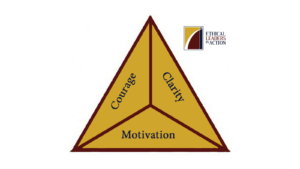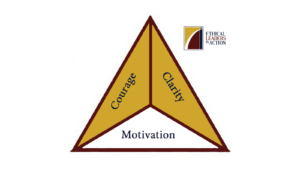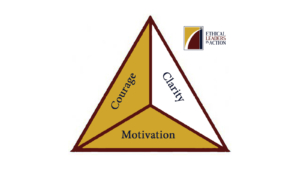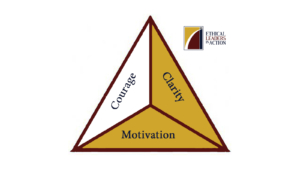The Elements of Moral Action: Transcript
The Elements of Moral Action
This is the transcript of the Ethical Leaders in Action video: The Elements of Moral Action. The video can be viewed on our YouTube channel at https://youtu.be/2nD3Gpn_L8M.
:03 I’m Chad Weinstein for Ethical Leaders in Action. Welcome to our first video blog. One of the metaphors that leaders love to use is that of a moral compass and there’s a lot of wisdom in the metaphor. A compass is a critical tool in determining where we are, how we’re oriented and figuring out where we’re going. And in no realm is that more important than in the realm of moral and ethical decision-making. But sometimes metaphors limit us. And I think in this case, the compass metaphor may hide from us some of the real capacities that we can develop in ourselves to become more effective as ethical leaders and more effective is decision-makers.
:50 Our ability to do and be our best is guided and powered by three interlocking capacities: Moral Motivation, Moral Clarity and Moral Courage.
By looking at each of these in turn we can develop some insights into what’s going on when we make decisions so that we can be better equipped to guide that decision-making process. It also enables us to be more effective coaches, mentors, and leaders of others as we help them to do and be their best.
1:34 Let’s look first at Moral Motivation.
This is the baseline commitment to make the best choices. This is the concern for the morality and ethics of the choices that we make. This is the inner drive to truly be your best and act in ways that are consistent with our vision for who we should be as leaders. Moral Motivation is a baseline capacity but it’s not something we can take for granted. Our motivation is influenced by our circumstances. It’s influenced by our state of mind and condition. The old saying goes “fatigue makes cowards of us all.” Too often we have seen people distracted by goals that are at odds with their deeper values. In these instances we see a failure in part of moral motivation. By being aware of the values and commitments that drive us, we can bolster that moral motivation. By celebrating our successes and by pausing to reflect and learn from our shortcomings, we strengthen in ourselves that desire for continuous improvement and that desire to be an agent for improvement in the world around us. In other words, we drive our own Moral Motivation.
3:03 Moral Clarity is more cognitive in nature.
It’s our capacity to discern the particulars of the situation, to identify options, and to evaluate those options to make the best choices. Moral Clarity also enables us as a leader to help others to make the best choices as well. It allows us to engage team members and colleagues in discussions that lead to a true exploration of different perspectives, different goals, different values, and ultimately to converge on the best possible choice. We develop Moral Clarity by learning frameworks for decision-making and by practicing them over time. We also develop Moral Clarity by being sensitive and aware of experiences; being willing to learn from the outcomes of our decisions and to adjust our thinking over time based on that experience.
4:02 Moral Courage is our capacity to do what’s right, even when it’s difficult, even when it’s scary.
It’s the drive to push through adversity and to manage our emotions so that we can truly act in accordance with our values and in accordance with what our Clarity tells us is the best choice. Sometimes, we don’t need Moral Courage. Sometimes, doing the right thing is easy. But often enough we need to dig down in ourselves and find the strength to push through. Moral Courage is driven internally with clear values and a clear commitment to our own integrity and an awareness that our actions affect our character over time. Moral Courage is also influenced by our relationship with others. The best sorts of friends are people who encourage us to be our best. They celebrate with us our successes, call us on our shortcomings, and work with us to improve and learn from those experiences. Those are the relationships that drive Moral Courage. Those are the relationships that enable us to become stronger and to cultivate the drive, and the grit, and the determination – the commitment to truly be our best even when it’s tough.
5:34 Moral Courage, Moral Clarity, and Moral Motivation work together in an integrated way.
But by understanding them each as independent factors, we gain insights into how we can develop as leaders and how we can help others to do the same. In upcoming sessions we’ll look at specific techniques for cultivating and honing motivation, clarity, and courage. For now, I hope this insight provides you with a new way of looking at your experience and a different way of focusing on how you make decisions and how you follow through on those decisions even when it’s difficult.
Thank you.
At Ethical Leaders in Action we believe that most, if not all people, can develop themselves to play leadership roles in many different spheres both large and small. The foundation of this development process is a short but powerful list of virtues which can be developed and improved through conscious effort. For more information feel free to take the Virtues of Ethical Leadership Self Inventory (VELSI) which breaks these virtues down into features that can be individually developed. The results of the VELSI come with a quick reference guide to help you understand how the virtues and their individual features fit together. https://ethinact.com/velsi/
See a list of other posts in this series at Blog Post Series
Subscribe to the ELA blog. https://ethinact.com/blog/e-mail-subscribe/





Leave a Reply
Want to join the discussion?Feel free to contribute!